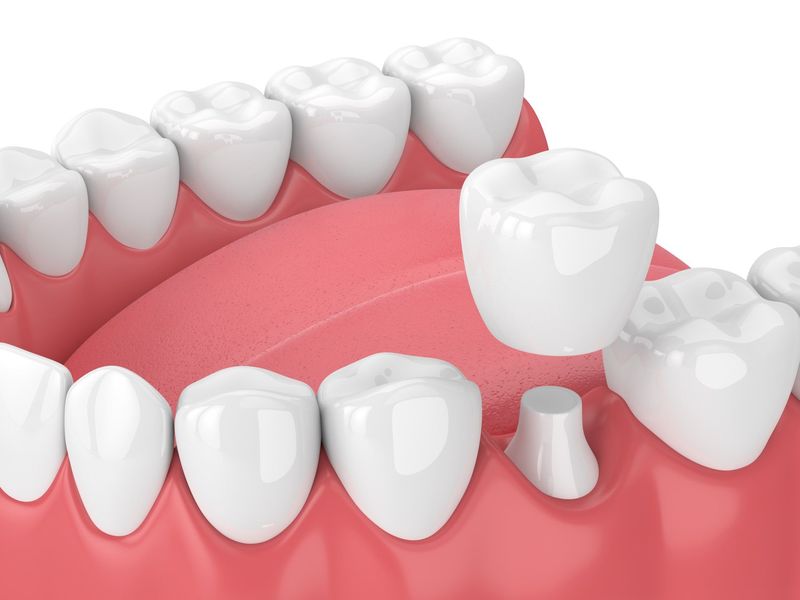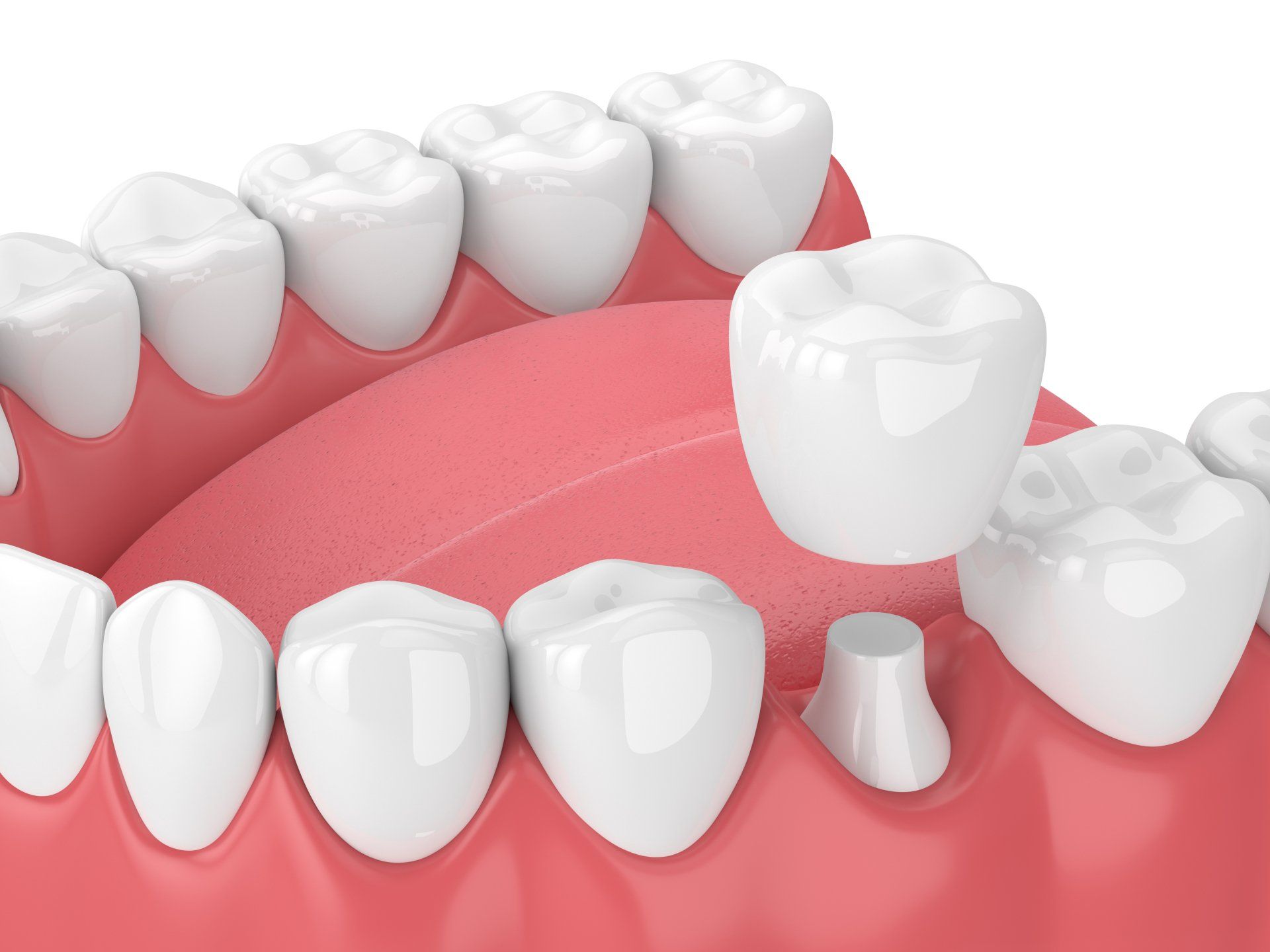
Dental crowns are a vital aspect of various dental treatments, providing protective caps for damaged or weakened teeth. They serve a dual purpose by restoring both tooth function and aesthetics. These versatile restorations are custom-fitted to cover afflicted teeth, offering strength, protection, and an improved appearance. Crowns are used to address a range of dental issues, from decay to cracked or broken teeth, and even to support dental bridges. By enveloping the visible part of a tooth, crowns enhance its functionality and appearance, enabling comfortable chewing and speaking. In the world of dentistry, crowns are unquestionably indispensable, playing a crucial role in oral health restoration and confidence-boosting smiles.
Crowns are a significant dental treatment, used to restore damaged teeth. The process involves preparing the tooth, creating a custom crown, and offering both aesthetic and functional benefits. Typically used for severe cases. Consulting a dentist is vital for suitability.

Are Crowns Major Dental?
When it comes to dental procedures, crowns are a major player. They are commonly used to restore damaged teeth and improve their appearance. But what exactly are dental crowns and why are they considered a major part of dental treatment? In this article, we will explore the world of dental crowns, their benefits, and their importance in maintaining oral health.
What Are Dental Crowns?
A dental crown, also known as a dental cap, is a custom-made prosthetic device that is placed over a damaged or decayed tooth. It is designed to cover the entire visible portion of the tooth, providing protection and restoring its shape, size, strength, and appearance. Dental crowns are often made from materials such as porcelain, ceramic, metal, or a combination of these materials.
Dental crowns are used for various reasons, including:
- Protecting weak or damaged teeth
- Restoring broken or severely worn-down teeth
- Supporting dental bridges
- Covering dental implants
- Improving the appearance of misshapen or discolored teeth
The Process of Getting a Dental Crown
Getting a dental crown typically involves multiple steps. First, the dentist will assess the tooth and determine if a crown is necessary. If so, they will prepare the tooth by removing any decay and shaping it to accommodate the crown. An impression of the tooth is then taken to create a custom crown that fits perfectly. In the meantime, a temporary crown may be placed to protect the tooth.
Once the permanent crown is ready, it is bonded to the tooth using a dental adhesive. The dentist will ensure that the crown fits well and feels comfortable. With proper care and regular dental check-ups, a dental crown can last for many years, providing durability and functionality to the treated tooth.
Benefits of Dental Crowns
Dental crowns offer several benefits that make them a major part of dental treatment. Some of these benefits include:
- Restoration of tooth functionality: Dental crowns can restore the proper functionality of a damaged tooth, allowing you to bite and chew without discomfort or difficulty.
- Protection of weak teeth: Crowns provide a protective barrier for weak teeth, preventing further damage and reducing the risk of fractures or breakages.
- Improved appearance: Crowns can enhance the appearance of teeth by covering imperfections such as stains, chips, or misalignments.
- Long-lasting durability: With proper care, dental crowns can last for many years, providing a durable solution for tooth restoration.
- Support for dental bridges: Crowns are used to support dental bridges, which are prosthetic devices used to replace missing teeth.
Are Crowns Major Dental? The Answer is Yes!
Considering the various functions and benefits of dental crowns, it is safe to say that they are indeed a major part of dental treatment. Whether it’s protecting weakened teeth, restoring broken teeth, or enhancing the appearance of your smile, dental crowns play a crucial role in maintaining oral health and improving overall dental well-being.
So, if you have a damaged or decayed tooth, consult with your dentist to determine if a dental crown is the right solution for you. With their expertise and the use of dental crowns, you can regain the functionality and aesthetics of your teeth, ensuring a healthy and confident smile.
Key Takeaways: Are Crowns Major Dental?
- Crowns are a common dental procedure that can be considered major.
- They are used to restore damaged teeth or improve their appearance.
- Crowns are often made from materials like porcelain or metal.
- The process involves removing some of the tooth’s structure and then placing the crown over it.
- Crowns can last for many years with proper care and maintenance.
Frequently Asked Questions
What are dental crowns?
A dental crown, or dental cap, is a restoration used to cover and restore damaged teeth, enhancing their shape, size, strength, and appearance. These crowns are custom-made from materials like porcelain or metal to match natural teeth, offering a seamless look. They are frequently applied for teeth with decay, root canals, fractures, chips, dental implants, or to support dental bridges.
Are dental crowns considered major dental procedures?
Dental crowns are significant procedures, typically requiring two visits. The first visit involves tooth preparation, taking impressions for a custom crown, and placing a temporary crown. On the second visit, the permanent crown is fitted, adjusted, and bonded with dental cement. The process often necessitates local anesthesia and takes a few weeks.
How long do dental crowns last?
The lifespan of a dental crown ranges from 5 to 15 years, contingent on factors like the material used, oral care, and habits. Maintaining oral hygiene, avoiding certain foods, and regular dental check-ups can extend crown longevity. Be aware that crowns can wear or become damaged over time, necessitating evaluation, repair, or replacement by a dentist if issues arise.
Are dental crowns painful?
Getting a dental crown is usually painless, thanks to local anesthesia that numbs the treated tooth’s area. Afterward, mild discomfort or sensitivity may occur, but over-the-counter pain relievers can manage it. For concerns about pain, discussing them with your dentist for personalized information and reassurance is advisable.
Can dental crowns improve the appearance of my smile?
Dental crowns enhance smile aesthetics by matching the color, shape, and size of natural teeth, addressing issues like discoloration, misalignment, and irregular shapes. Beyond cosmetic benefits, they offer strength and protection to weakened teeth, restoring functionality and preventing future dental issues.
Dental Crown Procedure
Final Thoughts on Crowns: A Major Dental Solution
Crowns are a cornerstone of modern dentistry, playing a pivotal role in both oral health maintenance and smile restoration. They fortify weakened teeth, enhance aesthetics, and improve functionality, making them a versatile dental solution. These custom-fitted caps not only shield damaged teeth but also provide a natural-looking appearance that seamlessly integrates with the rest of your teeth. Whether it’s a cracked tooth, severe decay, or a cosmetic concern, crowns can be tailored to meet your specific needs, ensuring a comfortable and confident smile. In essence, crowns are a significant dental treatment that addresses a wide array of dental issues, contributing to oral health preservation and smile enhancement. When in need of dental restoration, considering crowns is a prudent investment for both your oral health and overall well-being.
Call or Book appointment online
:Ace Dental Care Alpharetta office: 678-562-1555 - Book Now
Ace Dental Care Norcross office: 770-806-1255 - Book Now
Disclaimer
This blog post was generated by artificial intelligence. The content of this post may not be accurate or complete, and should not be relied upon as a substitute for professional advice. If you have any questions about the content of this post, please contact us.
We are constantly working to improve the accuracy and quality of our AI-generated content. However, there may still be errors or inaccuracies. We apologize for any inconvenience this may cause.





